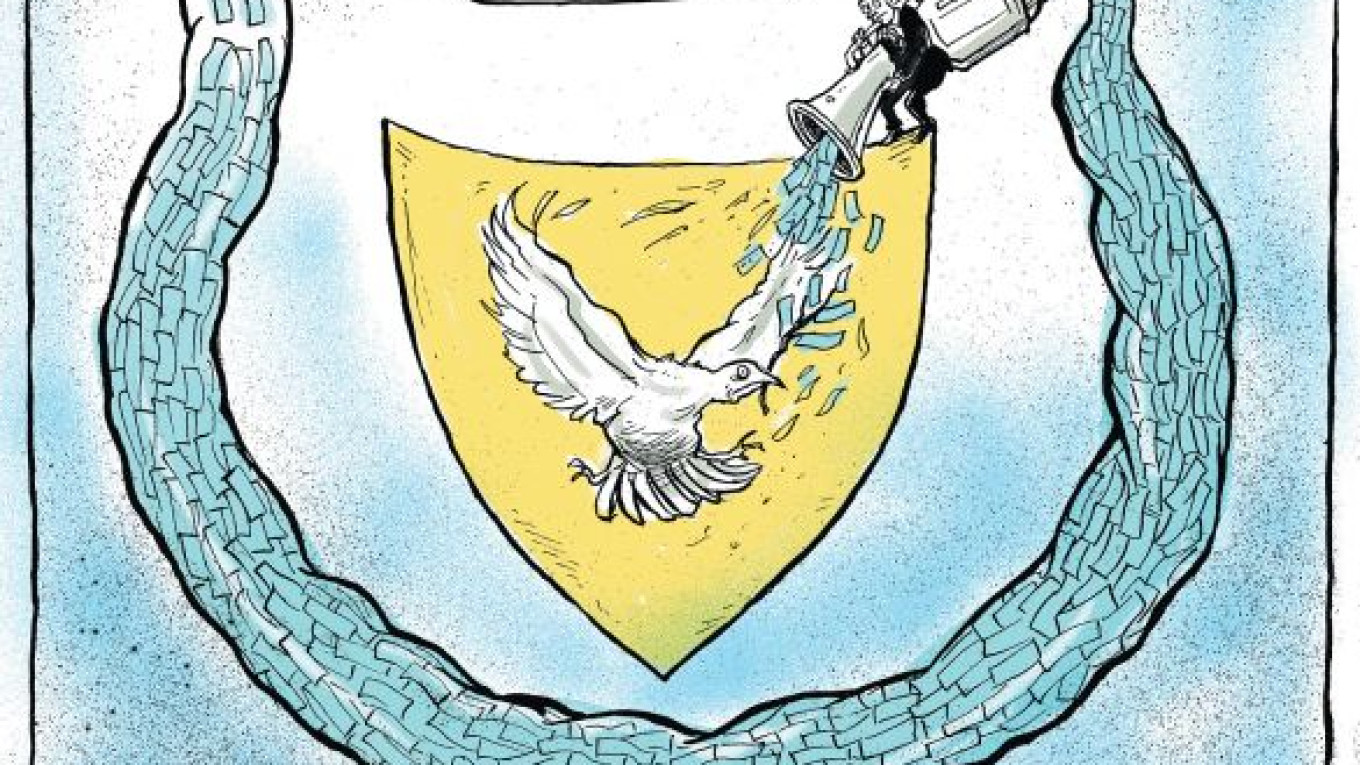The drama on Cyprus has encompassed all the features of a television soap opera. Moreover, nobody can say how many episodes there will be, which is also par for the course in the genre.
But the most important event has already taken place. The Cypriot government has decided to shut down the island's second-biggest bank and to raid bank deposits of more than 100,000 euros in order to secure a 10 billion euro bailout from the European Union.
Any sentiments regarding the betrayal of bank clients' trust can, obviously, be discarded; the clients are stuck and won't disappear. For Russians, placing money in a foreign bank and accepting all the attendant risks is still a choice available to any individual and any company. But having an account in your own country is not a matter of choice. In most countries, wages are no longer paid in cash but transferred to bank accounts. The same goes for large cash transactions — they are simply illegal, and must be conducted through banks. Of course, all this is done in the interests of honesty: to exclude the turnover of cash received illegally. After all, we should not even think about allowing dirty money into the economy, should we?
This leads to the inevitable question: do the clients' funds so surprisingly seized by the Cypriot authorities automatically become dirty money? After all, a mechanism to allow the forced seizure from all and sundry has not yet been envisaged by law, at least within the bounds of European civilization.
This is precisely the issue that the Cypriot authorities had to resolve. At the same time, they had to assume all reputational damages because they are debtors, in any case.
Cypriot authorities decided, however, that the reputation of the creditors would remain pure and unsullied. The initiative was up to the government, and it acted voluntarily. In other words, they froze all big bank accounts: those of native Cypriots, and those of foreigners. Clean money, dirty money — what did it matter? They just grabbed everything.
This outcome was a watered-down version of an initial proposal that would have seen a "one-time tax" levied on all bank accounts. The authors of this idea had wanted to force the parliament to vote in favor, thereby legalizing the seizure, and to conduct the entire procedure under the guise of a national bank holiday.
The subject of the "voluntary" agreement was covered widely by the mass media. Try a Yandex search on the subject "Cyprus wants" and you'll get the response, "Cyprus wants to tax all bank accounts in the country."
But surprisingly, Cyprus balked at the initial proposal — and not only because of the demonstrations outside the parliament building. The rejection was confirmed by voting within parliament itself and broadcast live to boot. It emerged that Cyprus has a Constitution that prohibits this sort of chicanery. Not a single Cypriot lawmaker raised a hand in favor of the measure, and the copyright for the idea was returned to its authors in pristine condition. The authors are well known: the demand was sent to Cypriot authorities by creditors from the European Commission, the EU and the IMF, to whom the country had turned for financial assistance.
The Cypriot government ended up having to pass the revamped bailout plan on its own, without the approval of parliament.
It stands to reason that the idea of seizing clients' funds without their permission will not disappear. Other countries within the EU also have unstable economies and large foreign debts. Somewhere or other a precedent shall be enforced and set because, as a rule, it is not easy to stand up to creditors' demands. Simply put, the time has come to realize that no bank accounts within the EU are now surprise-free.
As far as Russia is concerned, this is a sobering signal. The unfolding drama in Cyprus has been painful for individual savers. But it is not the end of the world. We have already weathered this sort of thing since 1917. The confiscation of currency, monetary reforms and defaults have caused people to lose their savings and to learn to survive without them. Imagining that robbery by the state is something that only happens to Russians is now a senseless and costly illusion. It probably behooves us to ensure that something like this never happens to us again. After all Russia, unlike Ukraine, does not seem to be in any hurry to join the EU.
Yet the admission of Prime Minister Dmitry Medvedev that organizations controlled by the Russian government hold funds in foreign offshore bank accounts calls for conclusions to be drawn at the highest levels of power — while there is still time, and if it is not too late.
Irina Ratushinskaya is a poet and writer.
Related articles:
A Message from The Moscow Times:
Dear readers,
We are facing unprecedented challenges. Russia's Prosecutor General's Office has designated The Moscow Times as an "undesirable" organization, criminalizing our work and putting our staff at risk of prosecution. This follows our earlier unjust labeling as a "foreign agent."
These actions are direct attempts to silence independent journalism in Russia. The authorities claim our work "discredits the decisions of the Russian leadership." We see things differently: we strive to provide accurate, unbiased reporting on Russia.
We, the journalists of The Moscow Times, refuse to be silenced. But to continue our work, we need your help.
Your support, no matter how small, makes a world of difference. If you can, please support us monthly starting from just $2. It's quick to set up, and every contribution makes a significant impact.
By supporting The Moscow Times, you're defending open, independent journalism in the face of repression. Thank you for standing with us.
Remind me later.


